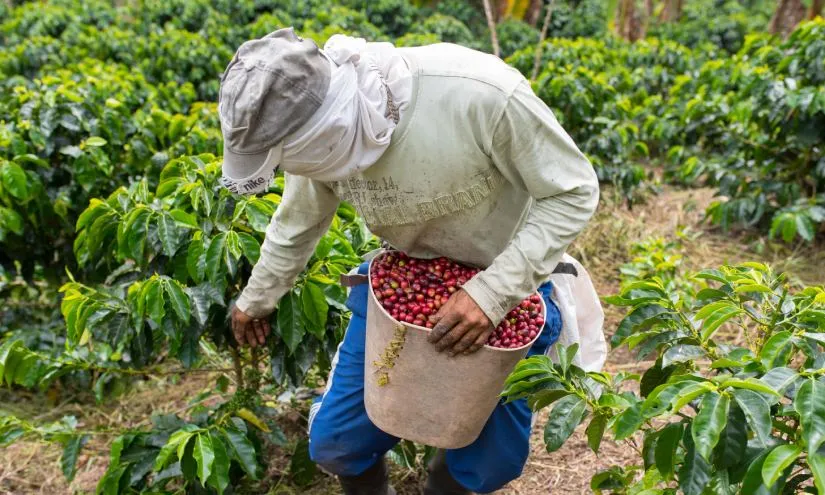
Coffee Farmers Ongoing Struggle for Working Capital
In the intricate landscape of coffee production, the seasonal nature of harvesting sets forth a unique challenge for coffee farmers. Typically receiving payment once a year during the harvest season, these farmers are entrusted with managing this lump sum throughout the year. However, the unpredictability of yields, unforeseen expenses, and the ever-changing market dynamics often propel them into a constant search for financial solutions.
Smallholder Farmers Caught in the Cycle:
For smallholder coffee farmers, particularly those who rely on each harvest for sustenance, the challenges are magnified. Living harvest to harvest, they often lack the financial cushion to navigate the rest of the year. The absence of substantial profits and limited collateral further complicates their ability to secure loans with favorable interest rates, rendering credit either unattainable or economically burdensome.
Co-operatives as a Beacon of Hope:
In an attempt to alleviate these challenges, some smallholders opt to join co-operatives. These collaborative ventures not only help in sharing the costs of inputs like fertilizers and pesticides but also make it more likely for lenders to extend financial support to larger groups of producers. However, the reality is that not all smallholder farmers can readily find solace in joining a co-operative, and the barriers persist.
Barriers to Finance Access:
Accessing finance is no straightforward feat for coffee farmers, particularly those residing in rural areas. A significant stumbling block is the pervasive issue of financial literacy. Camilo Enciso, the general manager of ASOPEP in Planadas, Colombia, notes the difficulty faced by unorganized producers in receiving financial support. In regions where the sale of wet coffee is predominant, the lack of market assessments and traceability further compounds the problem.
Additionally, many smallholder farmers lack the basic financial literacy required for borrowing, and their absence of credit history leaves banks without a reliable basis for risk assessment. Land ownership documentation, a prerequisite for many financial transactions, is often missing, exacerbated by social issues such as gender-related restrictions on land ownership.
The Crucial Role of Financial Literacy Programs:
To address these challenges, the implementation of financial literacy programs and the establishment of effective documentation management practices are imperative. Co-operatives, as intermediaries between farmers and lenders, play a vital role in supporting farmers in gathering and organizing the necessary documentation and data for loan applications.
Challenges on the Ground:
While co-operatives are seen as potential sources of data on previous harvests for individual farmers seeking loans, the reality is far from simple. Farmers often face resistance when requesting such information from previous lenders within co-operatives, potentially compromising their positions as lenders themselves. Some producing communities have resorted to a system of mutual borrowing and lending, fostering interdependence among farmers.
This collaborative system, however, comes with its own set of complexities. Farmers supporting each other through loans during both off-seasons and harvests establishes a delicate balance that intertwines economic conditions with social implications. Introducing external financing mechanisms could potentially disrupt these longstanding collaborative systems.
Market Volatility and Climate Change:
The coffee industry is not immune to broader economic and environmental challenges. Market volatility in recent years has injected increased uncertainty into the income projections for coffee farmers, affecting their perceived risk to lenders. Concurrently, the escalating impact of climate change, evident in rising instances of pests, diseases, and erratic weather patterns, has made lenders more cautious about financing coffee farming, often attaching prohibitively high-interest rates.
Supply Chain Challenges:
Farmers, grappling with delayed payments and soaring costs, sometimes turn to supply chain partners for assistance. However, the challenges faced by roasters, such as global inflation and delayed payments, as well as traders dealing with record-high interest rates and falling coffee prices, have created a precarious financial environment. This has diminished the capacity of supply chain partners to provide the financial support that farmers once relied on.
Questioning the Dependency on Loans:
Zooming out to a broader perspective, it becomes pertinent to question why loans have become an inherent part of the coffee industry. Taya, a coffee production researcher, raises a crucial point: “If the system that you live in is dependent on getting a loan and you can’t get one, then that really is a problem.”
There’s a need to scrutinize whether the coffee industry, in its current state, perpetuates a cycle of dependence on external finance. Taya challenges the assumption that farmers should always need a loan, suggesting that a fundamental reevaluation of the system may be in order.
Striving for Systemic Change:
While the long-term goal may be to improve financial education and reduce dependence on external finance, the immediacy of the issue necessitates short-term strategies. The focus should be on creating strategies that improve the accessibility of finance in rural areas, acknowledging that change of such magnitude is a slow process, and farmers often require immediate access to working capital.
In conclusion, the ongoing struggles of coffee farmers to access working capital underscore the need for holistic and nuanced solutions. From financial literacy programs to addressing systemic issues within the industry, a collaborative effort is essential to create a more resilient and equitable coffee sector that empowers those at the heart of the supply chain.



